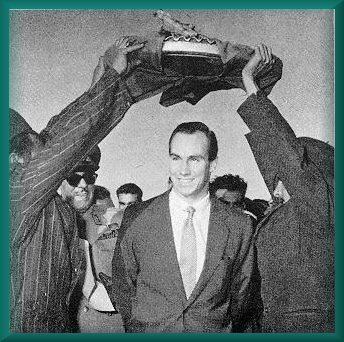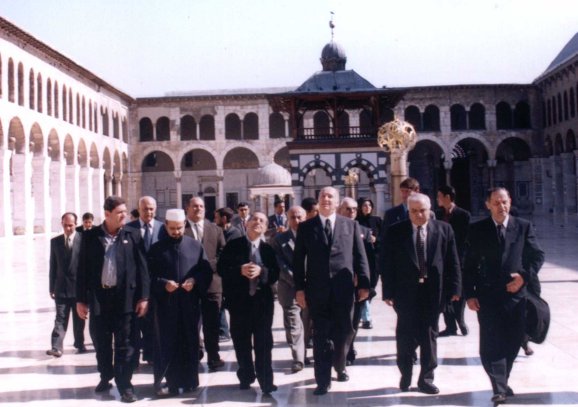
![]() Press Release
Press Release
DAMASCUS Nov.10 (SANA)
The Spiritual Leader of the world's Ismaili Muslims, Prince Kareem Agha Khan and Premier Mohammad Mostafa Miro signed here Saturday an agreement of cooperation for development between Syrian government and the Agha Khan network for development.
The agreement included cooperation in fields of teaching, health, education, planning, building, tourism, trade, industry and countryside development.
Earlier in the day, the Prince Kareem Agha Khan and the accompanying delegation visited Salamyea.
The Prince and the accompanying delegation paid tribute to the tomb of his late father, Prince Ali Khan and laid a wreath of flowers and recited holy verses from the Qoran to his soul.
Later on, the Prince made a speech in front of tens of the people where he voiced his happiness to this visit noting to his old origins in this historical city.
He voiced his thanks to Syria's people, government and President Bashar Assad for the good reception of him.
The Prince noted that the Islamic religion calls for tolerance, fraternity and coexistence among peoples of the world.
He underlined that Islam is the region of the spiritual and high values.
He highly lauded the national coexistence in Syria which is, through her long history an example of an active and fruitful interaction among peoples, races, different religions and cultures.
He appreciated the national unity in Syria under the leadership of President Bashar Assad.
- M.Abdo / G.A.Hassoun - Sana.org
TARTOUS Nov.9
The Spiritual Leader of the world's Ismaili Muslims, Prince Kareem Agha Khan highly appreciated what he has seen in Syria of aspects of tolerance, fraternity and the joint living between the different groups.
During a meeting with mass of citizens in Tartous today, he noted that the basis which the Agha Khan foundation for development would depend on during cooperation with the Syrian institutions was put on.
"Islam imposes on the individual to balance between the spiritual life and the financial life and his efforts have to be based on the values of Islam." the Prince added.
Later on, the Prince visited the archaeological Mesyaf castle and was briefed on the restoration acts in it.
- M.Abdo / G.A.Hassoun - Sana.org

Press Release
Al Khwabi, Syria, 9th November, 2001— His Highness the Aga Khan, Imam of the Shia Ismaili Muslims, today described how he saw Syria facing the challenges of the future in the context of the current global situation.
“In recent years, human society has, sadly, witnessed a polarisation of differences amongst people into all forms of conflict,” said the Aga Khan. “This is a situation which I deplore and which cannot be acceptable to any individual who aspires to live life in peace, dignity and security.”
The Aga Khan, who is on an extensive visit to Syria, was speaking to over ten thousand people of different traditions of Islam and of other faiths gathered in this picturesque mountain valley in which large numbers of Ismaili Muslims have had a long history.
“It is thus clearly evident,” said the Aga Khan, “that peace in the decades ahead can only be achieved when the pluralist nature of human society is understood, valued, and built upon, to construct a better future. In Islam, the pluralism of human society is well recognised, and the ethics of its multiple interpretations require that this diversity be accorded respect.”
The Aga Khan reminded his audience that “the shahada (the Muslim profession of faith), La-illaha-Illallah-Muhammadur-Rasullilah – binds a thousand million people who, over the centuries, have come to live in different cultures, speak different languages, live in different political contexts, and who differentiate in some interpretations of their faith.”
“The plurality of the Muslim world” he stressed, “is not just an irreversible historical fact, but it is a strength for which we must be grateful, and a strength that must be continuously harnessed to the building of the future within the ethics of Islam.”
“Any differences must be resolved through tolerance, through understanding, through compassion, through dialogue, through forgiveness, through generosity, all of which represent the ethics of Islam.”
Noting with “deep happiness and admiration that here in Syria the principles of tolerance, brotherhood, and mutual support amongst communities are already well established,” the Aga Khan said, “perhaps more could be done, in particular, by greater and strengthened collaboration in identifying and analysing social and economic challenges that lie ahead, and in determining how best to anticipate and respond to them.”
The Aga Khan also spoke of “the new global context in which countries, or regions, will be in competition with each other, to develop a better quality of life for their populations” and said that “in the forthcoming decades, countries, institutions, organisations and programmes, to be effective, will need to be increasingly competent in whatever they are doing. Today, and even more so for generations to come, that will require more consideration to be given to meritocracy.”
He confirmed “that during this visit, a context has been set, whereby all the agencies of the Aga Khan Development Network will be positioned to contribute to the future economic and social strengthening of Syria, its peoples and institutions.” The Aga Khan said “we hold in common many convictions about the best way to build for the future, including our trust and confidence in pluralism; a need to respond to the challenges of modern global society; a need to make decisions and prepare for institutional leadership through meritocratic processes; the need for society to draw strength and direction from shared ethical principles, including generosity in the use of intellect, professional competencies and voluntary service.”
Advising the younger members at the gathering, the Aga Khan urged them “ to remember that in today's world of accelerating change, education is, and should remain, a lifelong process. It is only by investing continuously in your intellectual capacities that you can hope to survive in the world of tomorrow.”
The Aga Khan reiterated that “Islam enjoins upon an individual the maintaining of a balance between spiritual life and material well-being, and to ensure that his or her material endeavours are underpinned by the ethical principles of Islam. This balance between din and dunya entails not only the fulfilment of the individual's spiritual obligation but also of the obligation to acquire knowledge and to use it for the benefit of others.”
The Aga Khan continues his visit to Syria.
For further information, please contact:
The Information Office Damascus
Telephone: (963.11) 2113005
Fax: (963.11) 2113001
Source: The Aga Khan Development Network (AKDN) Website
![]() Mowlana Hazar Imam's Visit to Syria
Mowlana Hazar Imam's Visit to Syria
![]() Mowlana Hazar Imam's Visit to Tajikistan
Mowlana Hazar Imam's Visit to Tajikistan
